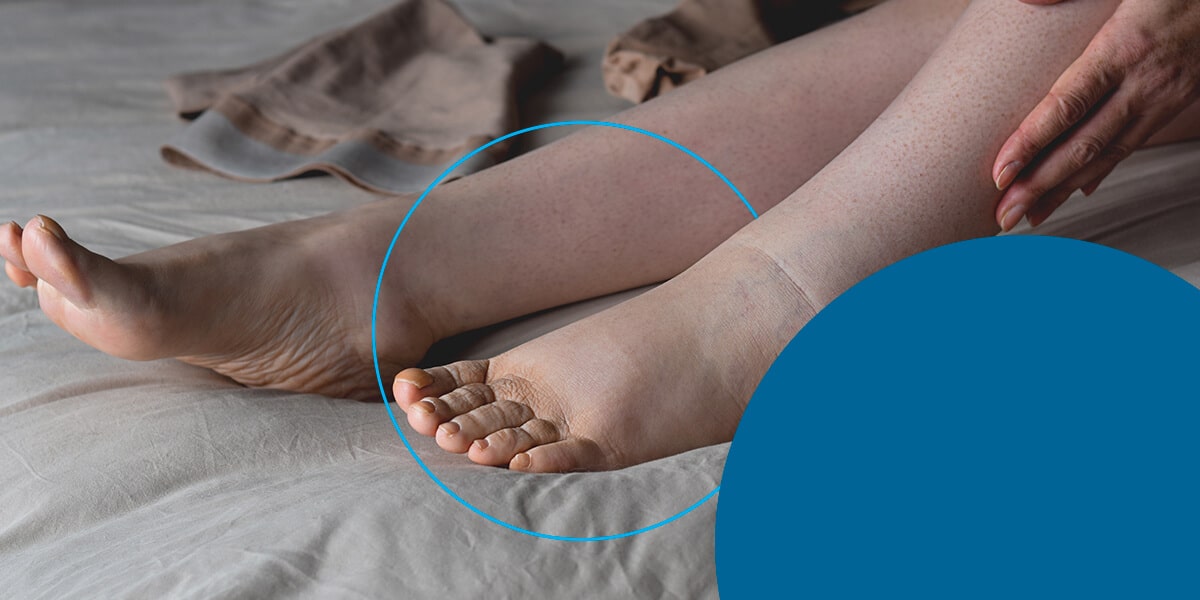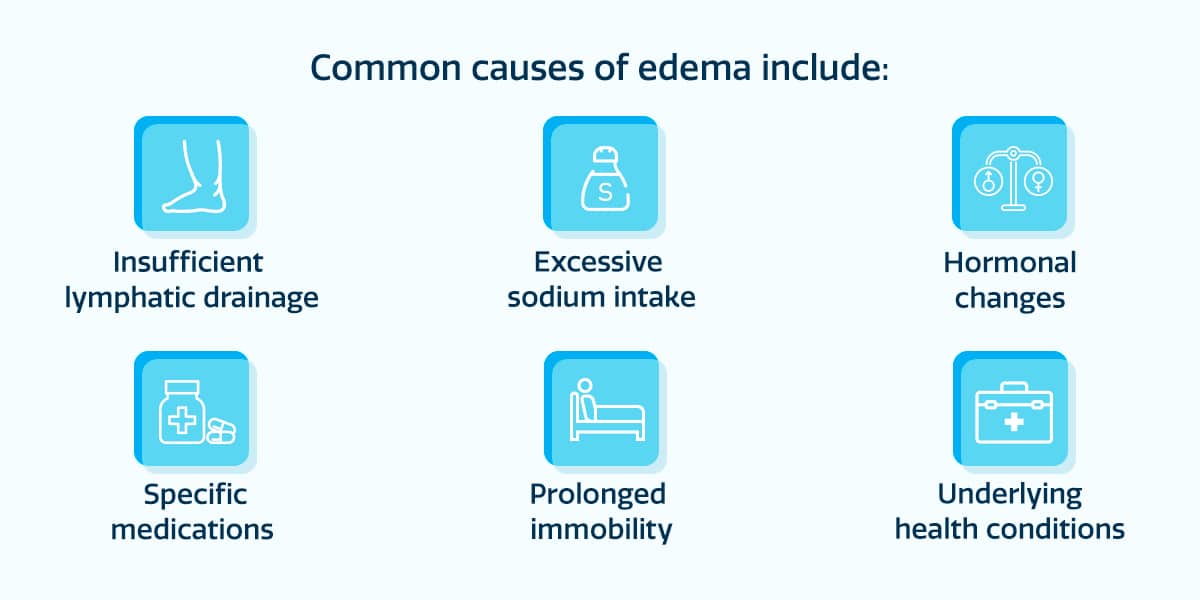
Edema, or excessive swelling, is a condition characterized by abnormal fluid accumulation. It can affect any body part, causing discomfort and limited mobility. Edema can result from various factors, including injury, medical conditions or prolonged sitting or standing.
Understanding edema’s causes, symptoms and treatment options is essential for managing it. This article will explore why edema happens, its impact on daily life and when to see a professional for a diagnosis and effective remedies.
What Is Edema?
Some health conditions and medications cause fluid accumulation in the body’s tissues. Edema is most common in the legs and feet or hands and arms.
You should know how your body usually deals with fluid to understand what leads to edema. Typically, your circulatory and lymphatic systems work together to create balance and remove excess fluids from tissues to prevent buildup. Edema occurs when these systems malfunction.
Types of Edema
Edema can manifest in different forms and occur externally or internally. The condition may be temporary or chronic, depending on the underlying cause. There are several different types of edema.
- Peripheral edema: Peripheral edema is usually a result of physical inactivity, standing or sitting for long periods. It typically signifies an issue with your circulatory system, lymph nodes or kidneys. Your body may struggle to circulate blood from your feet and legs to your heart.
- Pulmonary edema: Unlike most edema, where the fluid collects in your limbs, pulmonary edema is when the fluid accumulates in your lungs’ air sacs, making breathing difficult. Heart conditions and infections are usually the problem. It can worsen if you lie down, and you should call your doctor if you frequently deal with this.
- Pedal edema: Pedal edema is when the fluid gathers in your lower legs and feet. Your risk for pedal edema gets higher with age. Pregnant people are also vulnerable to this condition. The swelling and lack of sensation make it challenging to walk around.
- Lymphedema: Many edema cases relate to the lymphatic system. Lymphedema is damage to your lymph nodes due to medications, surgery or radiation.
- Pitting edema: Pitting edema occurs when you press on your skin and create a dent that remains for a few seconds even after you remove your finger.
Edema swelling, puffiness and tightness can range from mild to debilitating, often accompanied by other symptoms like stretched, discolored or shiny skin. You may sometimes experience reduced flexibility and discomfort when moving the affected body part.
Edema Causes

Common causes of edema include insufficient lymphatic drainage, excessive sodium intake, hormonal changes, specific medications, prolonged immobility and underlying health conditions such as heart, liver, or kidney disease. Identifying and addressing the root cause is crucial for effectively managing edema.
The following factors can cause edema in your feet and other body parts.
- Venous insufficiency: If the veins in your legs fail to adequately send blood back to the heart, the blood pools instead and the fluids collect.
- Heart conditions: If your heart does not pump sufficiently, it will cause edema issues.
- Kidney disease: You may know your kidneys collect waste from your digestive system and other body parts. Overall, the kidneys regulate fluid balance. Your body retains the excess fluid when your kidneys malfunction.
- Pregnancy: Mild cases of edema are common during pregnancy due to hormonal changes. The increased pressure of carrying a growing baby also strains the veins.
- Medications: Blood pressure medication and steroids can affect the body’s fluids and cause edema.
- Dietary factors: Compounds such as salt tend to retain fluid. Excessive sodium intake might cause your body to accumulate water.
- Sedentary lifestyle: Fluids can pool if you sit or stand for prolonged periods without moving around.
Diagnosing Edema
Often, edema is a symptom of a more significant underlying condition. Health care professionals will start by asking you questions about your medical history before doing a physical examination. After this initial intake screening, they may do further testing.
- Blood tests: Blood tests are an excellent starting point that reveals information about various organs. They can tell your doctor if you have heart, kidney or liver problems. A blood test can also show the body’s overall fluid and electrolyte balance, thereby ruling out or identifying specific issues.
- Urine analysis: If your health provider suspects you have a kidney issue, the next step is a minimally invasive urine sample. A specific protein can leak into your urine, indicating kidney disease in high amounts.
- Imaging: Imaging scans like X-rays, ultrasounds or CT scans can identify blood clots and determine if your heart works correctly.
These are only a few examples of the tests a health care provider could order, but they might also ask for more specialized screening. Your specific information and the degree of the edema will show the professional what direction to take.
How to Treat Edema
Managing edema requires a holistic approach that addresses the symptoms and causes. Treatment focuses on reducing fluid buildup and managing your condition. Lifestyle modifications like getting more active can be beneficial.
Mild edema usually resolves by itself if you move around and gently massage the area. For more severe cases, see a medical professional to determine the cause of the fluid buildup and get effective edema treatment.
Compression garments can improve blood flow and reduce swelling if you have frequent edema. Other treatments involve taking medication that helps flush salt and extra fluid out of your body. You can also try elevating the affected limb to use gravity to redirect the pooled fluid. Physical therapy is another option — a health care professional can manually remove lymphatic drainage.
Ask a Professional at Foot & Ankle Surgical Associates
At Foot & Ankle Surgical Associates, we provide our patients with the highest possible quality of care. We take the time to listen to your problems and history to find the root of the problem. Our knowledgeable team has expertise about all conditions that affect your feet and ankles, including edema.
Chat with us to start your treatment and find relief from your edema today.




